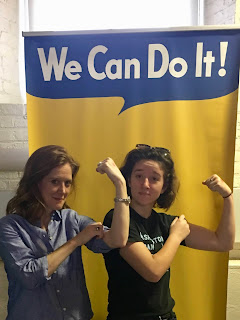Finding Mentors in National Security and Defense
Determination, Patience, and Perseverance are Key
Successfully finding your mentor in the national security field takes perseverance and effort. Courageously entering into the field takes herculean efforts to get a foot in the door and once established, growing within this arena takes meticulous skill, determination, and tenacity. Finding someone to help decode the system and who knows the processes is critical. To find the right mentor, whether internal or external to your agency takes work; you must be persistent. I am sharing with you steps used over my twenty years for finding the right fit and attributes to look for in a mentor.
Battle the Obstacles to Finding Your Mentor
Before even diving into finding a mentor, you must first ask why you seek one then decide what specific role you would like your potential mentor to provide. Simon Sinek was onto something when he referenced starting with “why” in finding your purpose.[2] Your own reasons in creating a potential lasting relationship starts with your own motivation to establish one. The preponderance of senior ranking people serving in the national security field hold positions of trust and worked for decades to get where they are today. Additionally, most of them are extremely busy and their most valuable asset is their time. Asking for a slice of their time and their focus requires that you’re dedicated to following up with your potential mentor’s requests and trust me, the work will be worth it.
Asking for help from someone often fills us with mixed feelings and consequently, this tricks our minds into thinking that asking for help makes us seem less likeable or less competent. Research shows this to be completely inaccurate. Someone who helps another actually likes them more after helping them. Mentoring boosts the mentor’s mood and makes them feel good about themselves and the person they mentor.[3] People also consistently underestimate their chances of getting the help they’ve asked for. People are actually more likely to help us than we assume. We are less likely to say no when we’ve already said yes, because of cognitive dissonance. “I am a nice, helpful person,” we think to ourselves, and we want to keep thinking of ourselves that way.[4] Asking for help is hard but reluctantly sitting on the sideline is harder because you miss out on the support or resources that mentor could provide.[5]
Unfortunately, women and underrepresented groups are not as likely to push for a mentor because of stereotypes. Carol Dweck states it best when she said, “Aside from hijacking people’s abilities, stereotypes also do damage by making people feel they don’t belong.” [6] The mentoring advice I’d give is to shed this bias or feeling and immediately seek someone in your profession, in your workplace to start the mentoring process. Those demonstrating a growth mindset get past the perceptions and believe in a since of belonging. Furthermore, they maintain this advantage even when they sensed a preponderance of negative stereotyping going around. Looking for mentors who mirror image yourself may be easier but it’s not going to provide the greatest growth. Instead, seek out a handful of multiple mentors, in multiple organizations.
Persistence and Perseverance
If you want to grow professionally, it is critical to look for those potential mentors who embody a growth mindset. Someone with a zest for teaching and learning, an openness to giving and receiving feedback, and an ability to confront and surround obstacles. If you see a potential mentor who demonstrates this and wants to open the door and teach you those skills, immediately sign up as their mentee. Carol Dweck aptly summarized this in her writing: when seeking a potential mentor, you should look for a potential mentor who conveys to you that his or her organization values learning and perseverance, and will provide advice that will promote your learning and future success.[7] Mentors should demonstrate their commitment and success in the field of their profession.
Take the advice of Calvin Coolidge when seeking out the right mentor, “Nothing in this world can take the place of persistence. Talent will not; nothing is more common than unsuccessful people with talent. Genius will not; unrewarded genius is almost a proverb. Education will not; the world is full of educated derelicts. Persistence and determination along are omnipotent. The slogan “press on” has solved and always will solve the problems of the human race.” Look for those who keep pressing as they are not only pressing for them, but everyone around them.
Finding a mentor takes not just persistence but perseverance. Stated best by Ryan Holiday in, The Obstacle Is the Way, “if persistence is attempting to solve some difficult problem with dogged determination and hammering until the break occurs, then plenty of people can be said to be persistent. But perseverance is something larger. It’s the long game. It’s about what happens not just in round one but in round two and every round after – and then the fighter after that and the fight after that, until the end. The Germans have a word for it: Sitzfleisch. Staying power.”[8] Achieving victory by running until you cross the finish line, in other words meaning you must persevere to find the people with staying power and who once committed to mentoring you will help you reach your goals.
A Good Fit
Feeling like you belong in your organization is critical to finding a mentor. It helps you identify the attributes you are seeking in a mentor and to focus on the things that reinforce helpful behavior. Beginning with a shared purpose and sense of identity. Most of us are somehow connected or inter-related in our work environment to someone you trust, respect, and who will deliver because they are committed to seeing others grow. Search to find the commonality and further develop the mentor/mentee relationship. This person serves as an example, guider, and demonstrator to a mentee on the path to success. A mentor remains when they see the positive outcome of their help and maintain a willingness to assist when feedback is provided.[9] Mentors want to see a mentally and emotionally strong mentee who digs down, faces adversities and failures, and keeps growing.[10]
When searching for a mentor internal to your organization you are in an advantageous position because of cognitive dissonance theory[11] According to this theory, having to make a choice between two similarly desirable alternatives, such as a mentee internal or external to the organization, triggers psychological discomfort. Decisions cause conflict when acknowledging the rejection of someone and the undesirable aspects of picking the wrong person.[12] Recall that mentors are busy, value their time, and mentoring someone internal not only gives that person a leg up but is investing in the future of the organization. Using that to your advantage allows for you to find a mentor interested in your success in that workforce. Mentors internal to the organization understand where you fit as a developing person and they’ll be interested in your continued internal development and progression.[13]
External Advantage
Additionally, seeking external mentors is just as important. Connecting with external mentors takes a bit more work but is worth it. Some of you may be fortunate to have an internal mentor recommend an external mentor, but other opportunities to seek external mentorship are at through academic professors, conferences, networking events, Linked In, and professional associations. This can be challenging as this does not happen automatically as people are focused internally but be persistent. You need to assure your potential mentor that you welcome the help her or she could provide. People know that you might resent unrequested help, so you need to convey that you actually want help. Be open to have people helping you in different ways.”[14] Advice mentees should seek external to their organization may focus on different standards and culture of that organization, requisite skills for the company, salary expectations, and opportunities in this field.
Step Up
If there is something you’d like to do then find someone who has done this before and seek their mentorship. Do you have questions about national security or defense rattling around in your mind? Take some small action to find that person who can help answer those questions. Don’t just wait for someone to contact you. You own the initiative and you have access to more wisdom that you currently use.[15] There are plenty of mentors in a sea of leaders. Take on the mindset of a beginner and seek a master in your current field or where you want to be. Dan Ward apply covered this when he explained that Zen practitioners at all levels of experience are encouraged to cultivate shoshin and maintain an openness to surprising possibilities. Doing this takes both beginners, who remind others what a beginner’s mind looks like, and experts who can explain the process to them, while also creatively looking for changes to that process.[16] Mentees who demonstrate openness to advice from a mentor can find themselves closer in proximity to goals they’d hoped to achieve. Mentors will look at the world as it is, instead of how a mentee wants it to be. Their imparted wisdom will help you grow.
-----------------------------------------------------------------------------------------------------------------
Thanks for reading, please consider subscribing.
Candice E. Frost is an active duty Colonel in the United States Army and the Director of Foreign Intelligence for the United States Army G-2. She is also the owner of Colonel Candid LLC (www.colonelcandid.com), a business consulting company on leadership and mentorship. All viewpoints are her own and do not reflect those of the United States government.
[1] Ryan Holiday, The Obstacle Is The Way, (New York: Penguin Group, 2014), 45.
[2] Simon Sink, Start With Why, (New York: Penguin, 2009), 39.
[3] Heidi Grant, Reinforcements, (Boston: Harvard Business Review, 2018), 53.
[4] Heidi Grant, Reinforcements, (Boston: Harvard Business Review, 2018), 35.
[5] Heidi Grant, Reinforcements, (Boston: Harvard Business Review, 2018), 19.
[6] Carol Dweck, Mindset, (New York: Ballantine Books, 2006), 77.
[7] Carol Dweck, Mindset, (New York: Ballantine Books, 2006), 141.
[8] Ryan Holiday, The Obstacle Is The Way, (New York: Penguin Group, 2014), 157.
[9] Heidi Grant, Reinforcements, (Boston: Harvard Business Review, 2018), 117.
[10] Carol Dweck, Mindset, (New York: Ballantine Books, 2006), 119.
[11] Leon Festinger, Conflict, Decision, and Dissonance, (Palo Alto, CA: Stanford University Press, 1964).
[12] Tali Sharot, The Optimism Bias, (New York: Pantheon Books, 2011), 142.
[13] Carol Dweck, Mindset, (New York: Ballantine Books, 2006), 211.
[14] Heidi Grant, Reinforcements, (Boston: Harvard Business Review, 2018), 97.
[15] Katharine Brooks, You Majored in What?, (New York: Plume Book, 2018), 287.
[16] Dan Ward, The Simplicity Cycle, (New York: Harper Collins, 2015), 126.




Comments
Post a Comment